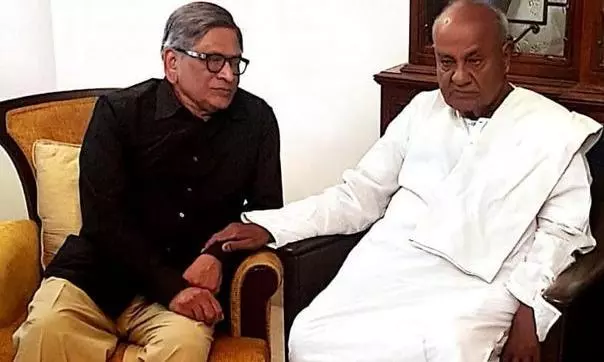
How SM Krishna and Deve Gowda shaped Karnataka's Vokkaliga politics
The political rivalry between Deve Gowda and SM Krishna extended beyond their individual ambitions to influence the next generation of Karnataka’s leadership

HD Deve Gowda and SM Krishna, two towering figures from Karnataka’s Vokkaliga community, shared a complex, competitive relationship centred around their influence in the politically significant Old Mysuru region.
Despite being a year younger, Deve Gowda's established stature as a leader among the Vokkaligas cast a long shadow over Krishna's political ambitions.
Krishna, seeking to cement his place, often tried to appeal to the Vokkaliga base but faced resistance from factions that labelled him a "suit-boot" leader, symbolising his perceived detachment from grassroots issues. This criticism impeded his efforts to build lasting support within the community, which remained loyal to Deve Gowda’s long-standing influence and trustworthiness.
Also read: SM Krishna was to Karnataka what Manmohan Singh was to India
A strained relationship
Krishna’s autobiography, Smriti Vahini, published in January 2020, sheds light on their strained relationship. Krishna reflected on their interactions during his tenure as chief minister (1999-2004), revealing that Deve Gowda frequently contacted him regarding matters such as transfers but that their bond never developed.
Krishna admitted that he could have made efforts to resolve their differences, acknowledging it as a potential failure on his part. He noted that during his time in office, Deve Gowda never looked at him with sympathy.
Krishna also recounted a key moment from 1999 when a file recommending a CBI investigation into a contract sanctioned by Deve Gowda came to him. Krishna chose not to pursue the investigation, stating in his autobiography: “If one sits indulging in personal hatred, no one will find peace in public life.”
Deve Gowda’s reaction to Krishna’s remarks was defensive.
He dismissed Krishna’s attempts to tarnish his reputation and emphasised that such criticisms were inconsequential to him.
He recalled his role in securing Krishna's election to the Rajya Sabha in 1994 despite significant political pressure from the Congress and the BJP which supported a rival candidate. This, Deve Gowda argued, showcased his genuine support for Krishna’s ascent and highlighted that Krishna's term as chief minister, while historic as a Vokkaliga leader, did not yield significant achievements.
Also read: SM Krishna obit: A 'high-tech’ CM’s lessons on living and dying with dignity
Rivalry continues
The political rivalry between Deve Gowda and Krishna extended beyond their individual ambitions to influence the next generation of Karnataka’s leadership.
This dynamic continued as Deve Gowda’s son HD Kumaraswamy and Krishna’s blue-eyed boy DK Shivakumar became central figures in their respective political parties. Krishna strengthened his bond with Shivakumar by making him a part of his family as his grandson married Shivakumar's daughter
Kumaraswamy, known for his strategic acumen and leadership within the Janata Dal (Secular), inherited his father's legacy and continued to vie for influence within the Vokkaliga community.
His political career often mirrored the competitive spirit of Deve Gowda’s era, with Kumaraswamy challenging the dominance of other leaders like Shivakumar.
Eyeing Vokkaliga votes
Shivakumar, who rose to prominence as a key Congress leader and a trusted ally of Krishna, positioned himself as a formidable force in Karnataka politics. His political ambitions and robust grassroots support made him a direct competitor to Kumaraswamy, leading to renewed tensions between their factions.
The rivalry between these leaders underscored the enduring significance of the Vokkaliga vote bank, and how this shaped alliances and strategies in the state’s political arena.
This generational rivalry reflected the ongoing battle for community loyalty and power within Karnataka, marking a legacy of competition that began with Deve Gowda and Krishna and continued through their political heirs.
